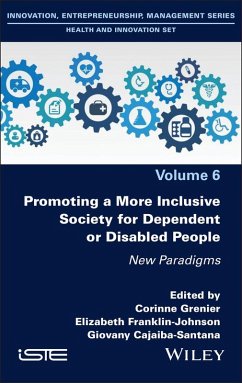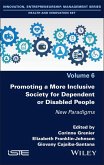Promoting a More Inclusive Society for Dependent or Disabled People (eBook, ePUB)
New Paradigms
Redaktion: Grenier, Corinne; Cajaiba-Santana, Giovany; Franklin-Johnson, Elizabeth
142,99 €
inkl. MwSt.
Sofort per Download lieferbar

0 °P sammeln
Promoting a More Inclusive Society for Dependent or Disabled People (eBook, ePUB)
New Paradigms
Redaktion: Grenier, Corinne; Cajaiba-Santana, Giovany; Franklin-Johnson, Elizabeth
- Format: ePub
- Merkliste
- Auf die Merkliste
- Bewerten Bewerten
- Teilen
- Produkt teilen
- Produkterinnerung
- Produkterinnerung

Bitte loggen Sie sich zunächst in Ihr Kundenkonto ein oder registrieren Sie sich bei
bücher.de, um das eBook-Abo tolino select nutzen zu können.
Hier können Sie sich einloggen
Hier können Sie sich einloggen
Sie sind bereits eingeloggt. Klicken Sie auf 2. tolino select Abo, um fortzufahren.

Bitte loggen Sie sich zunächst in Ihr Kundenkonto ein oder registrieren Sie sich bei bücher.de, um das eBook-Abo tolino select nutzen zu können.
Promoting a more inclusive society for the elderly, people with disabilities and, more broadly, all of those in vulnerable situations, implies profound changes in the healthcare system in many countries. This movement, known as "deinstitutionalization", implies strengthening people's participation in the decisions and activities that concern them, whether they live in an institution, in their ordinary environment, or in respect to their habits and life projects. The aim is to achieve social participation by considering the people we support as partners in our organizations, as genuine…mehr
- Geräte: eReader
- mit Kopierschutz
- eBook Hilfe
- Größe: 1.67MB
Andere Kunden interessierten sich auch für
![Promoting a More Inclusive Society for Dependent or Disabled People (eBook, PDF) Promoting a More Inclusive Society for Dependent or Disabled People (eBook, PDF)]() Promoting a More Inclusive Society for Dependent or Disabled People (eBook, PDF)142,99 €
Promoting a More Inclusive Society for Dependent or Disabled People (eBook, PDF)142,99 €![Planning and Support for People with Intellectual Disabilities (eBook, ePUB) Planning and Support for People with Intellectual Disabilities (eBook, ePUB)]() Planning and Support for People with Intellectual Disabilities (eBook, ePUB)31,95 €
Planning and Support for People with Intellectual Disabilities (eBook, ePUB)31,95 €![Health Equity (eBook, ePUB) Health Equity (eBook, ePUB)]() Health Equity (eBook, ePUB)60,99 €
Health Equity (eBook, ePUB)60,99 €![Psychiatry, Mental Institutions, and the Mad in Apartheid South Africa (eBook, ePUB) Psychiatry, Mental Institutions, and the Mad in Apartheid South Africa (eBook, ePUB)]() Tiffany Fawn JonesPsychiatry, Mental Institutions, and the Mad in Apartheid South Africa (eBook, ePUB)47,95 €
Tiffany Fawn JonesPsychiatry, Mental Institutions, and the Mad in Apartheid South Africa (eBook, ePUB)47,95 €![Disability in Antiquity (eBook, ePUB) Disability in Antiquity (eBook, ePUB)]() Disability in Antiquity (eBook, ePUB)47,95 €
Disability in Antiquity (eBook, ePUB)47,95 €![Caring (eBook, ePUB) Caring (eBook, ePUB)]() Caring (eBook, ePUB)52,95 €
Caring (eBook, ePUB)52,95 €![Chronic Pain, BDSM and Crip Time (eBook, ePUB) Chronic Pain, BDSM and Crip Time (eBook, ePUB)]() Emma SheppardChronic Pain, BDSM and Crip Time (eBook, ePUB)39,95 €
Emma SheppardChronic Pain, BDSM and Crip Time (eBook, ePUB)39,95 €-
-
-
Promoting a more inclusive society for the elderly, people with disabilities and, more broadly, all of those in vulnerable situations, implies profound changes in the healthcare system in many countries. This movement, known as "deinstitutionalization", implies strengthening people's participation in the decisions and activities that concern them, whether they live in an institution, in their ordinary environment, or in respect to their habits and life projects. The aim is to achieve social participation by considering the people we support as partners in our organizations, as genuine professional and institutional players who contribute to this transformation of the healthcare system. This book brings together contributions from over 40 researchers from different countries (notably French-speaking and Canadian), as well as patients involved in research, experimentation or associations. These contributions examine the terminological and legal foundations of a more inclusive society - the different mechanisms, innovative forms of housing and ways of supporting the public and professionals in favor of inclusion - and the different models for animating territories, therefore fostering the community commitment of favoring inclusion.
Dieser Download kann aus rechtlichen Gründen nur mit Rechnungsadresse in D ausgeliefert werden.
Produktdetails
- Produktdetails
- Verlag: John Wiley & Sons
- Seitenzahl: 371
- Erscheinungstermin: 14. Juli 2025
- Englisch
- ISBN-13: 9781394393596
- Artikelnr.: 74931134
- Verlag: John Wiley & Sons
- Seitenzahl: 371
- Erscheinungstermin: 14. Juli 2025
- Englisch
- ISBN-13: 9781394393596
- Artikelnr.: 74931134
- Herstellerkennzeichnung Die Herstellerinformationen sind derzeit nicht verfügbar.
Corinne Grenier is Senior HDR Professor of Strategy and Innovation, and Scientific Director of the "Territoires API" research chair (Inclusive and Enabling, KEDGE Business School, France). Elizabeth Franklin-Johnson is Associate Professor of Strategy and Sustainable Development, and Researcher for the "Territoires API" research chair (Inclusive and Enabling, KEDGE Business School, France). Giovany Cajaiba-Santana is Associate Professor of Sustainable Development and Ethics at the International University of Monaco, and Researcher for the "Territoires API" research chair (Inclusive and Enabling, KEDGE Business School, France).
Foreword xiii
Denis PIVETEAU
Introduction xvii
Corinne GRENIER, Elizabeth FRANKLIN-JOHNSON and Giovany CAJAIBA-SANTANA
I.1. Inclusion: challenging a social promise xviii
I.2. Examining the inclusive ideal: three points of entry xx
I.3. API Territories Chair: promoting enabling and empowering pathways xxi
I.4. References xxii
Part 1. Foundations for a More Inclusive Society 1
Introduction to Part 1 3
Corinne GRENIER, Elizabeth FRANKLIN-JOHNSON and Giovany CAJAIBA-SANTANA
Chapter 1. Deinstitutionalization at the United Nations Versus the French
Disability Sector 5
Estelle ARAGONA, Nicolas GUILHOT, Guillaume JAUBERT, Jean-Baptiste CAPGRAS
and Guillaume ROUSSET
1.1. Introduction 5
1.2. Legal context 7
1.3. The blind spots of deinstitutionalization 9
1.4. Conclusion 13
1.5. References 16
Chapter 2. Deinstitutionalization: A Threshold-Based Perspective 19
Roland JANVIER
2.1. Introduction 19
2.2. Inclusion and deinstitutionalization 21
2.3. An alternative framework for analyzing organizations 25
2.4. Conclusion: inclusion via thresholds? 29
2.5. References 32
Chapter 3. Living Independently and Institutions 35
Loïc ANDRIEN, Arnaud BÉAL, Chantal BRUNO, Jean-Philippe COBBAUT, Dominique
COSNIER, Etienne CREUSEVAUT, Souad CREUSEVAUT, Christophe DUPONT, Benoît
EYRAUD, Marika LEFKI and Céline LETAILLEUR
3.1. Introduction 35
3.2. Experiences of autonomy and institutionalization 38
3.3. Discussion 43
3.4. Conclusion 46
3.5. References 46
Chapter 4. Managing Social Impact in Innovative Healthcare Organizations 49
Elise LECLERC and Thierry SIBIEUDE
4.1. Introduction 49
4.2. The need for social impact assessment in the health sector 50
4.3. Three conditions for using social impact assessment as a strategic
management tool in healthcare innovation 54
4.4. Conclusion 60
4.5. References 61
Part 2. Support for Inclusion 65
Introduction to Part 2 67
Chapter 5. Reintegrating Children with Disabilities into Schools 69
Ophélia KARTI and Thierry CÔME
5.1. Introduction 69
5.2. Theoretical framework 71
5.3. Methodology and case study 73
5.4. Results 74
5.5. Discussion 83
5.6. Conclusion 84
5.7. Glossary 84
5.8. References 85
Chapter 6. Climate for Inclusion in the Workplace 87
Elizabeth FRANKLIN-JOHNSON and Katia RICHOMME-HUET
6.1. Introduction 87
6.2. Theoretical framework: workplace inclusion 88
6.3. Presentation of the study 91
6.4. Results 92
6.5. Conclusion 99
6.6. References 100
Chapter 7. Evolving Modalities of Support and Assistance: The Case of Peer
Support 103
Maud NEZAN and Myriam LE GOFF-PRONOST
7.1. Introduction 103
7.2. The evolution of peer support from an ancient form of caregiving 104
7.3. Methodology 105
7.4. The challenges of peer support as a new mode of assistance 107
7.5. Conclusion 114
7.6. References 114
Chapter 8. The Rights of Persons with Disabilities in Primary Care 117
Valérie SIRANYAN and Mai-Anh NGO
8.1. Developing a Healthcare Democracy for equal opportunity 117
8.2. Part 1: patients' and persons with disabilities' needs of healthcare
actors 119
8.3. Part 2: the practices of primary care providers 122
8.4. References 127
Chapter 9. Shared Housing: The Simon de Cyrène Association 131
Corinne GRENIER
9.1. Introduction 131
9.2. Research methodology 132
9.3. Context: inclusive housing in France and the SdC model 132
9.4. The first SdC shared housing project: an entrepreneurial initiative
with institutional scope 136
9.5. The SdC Federation and spin-off projects 140
9.6. Conclusion: inventing "our second wave" 144
9.7. References 145
Part 3. Engaging Territories for Inclusion 147
Introduction to Part 3 149
Chapter 10. Aging in Place: MaillAGE Living Lab Case Study 151
Isabelle MARCHAND, Olivier LAAU-LAURIN and Jacob CADIEUX
10.1. Introduction 151
10.2. Framework 152
10.3. Strategies supporting target communities' participation in the living
lab ecosystem 155
10.4. Promoting older adults' participation: implications for the MaillAGE
living lab's operations and stakeholders 158
10.5. Conclusion 161
10.6. References 161
Chapter 11. The Fight Against Loneliness: Social Experiments and
Innovations 165
Roland RIZOULIÈRES, Stéphanie GENTILE, Felicia FERRERA BIBAS and Maxime
MERY
11.1. Introduction 165
11.2. Is living in our "natural" home a tenable model? 168
11.3. Tackling aging and frailties through intergenerational living. 170
11.4. Conclusion 175
11.5. References 176
Chapter 12. Cross-Sector Collaboration in Healthcare: A New Paradigm for a
Preventative and Inclusive Approach 179
Pauline FAIVRE
12.1. Introduction 179
12.2. Theoretical framework 182
12.3. Case study of a social geriatrics program: the Fondation AGES 185
12.4. The importance of the social mission for a preventative approach to
healthcare 189
12.5. Conclusion 191
12.6. Appendix: example social geriatrics detection tool 192
12.7. References 193
Chapter 13. Co-Designing a Web Platform for Older Adults' Social
Participation in Quebec 195
Valérie POULIN, Mélanie LEVASSEUR, Marie-Michèle LORD, Hélène CARBONNEAU
and Rébecca GAUDET
13.1. Context 195
13.2. Theoretical framework 196
13.3. Method: action research 198
13.4. Results 201
13.4.1. Platform objectives, functionalities and content 201
13.5. Discussion. 204
13.6. Conclusion 206
13.7. Acknowledgments 207
13.8. References 208
List of Authors 211
Index 215
Denis PIVETEAU
Introduction xvii
Corinne GRENIER, Elizabeth FRANKLIN-JOHNSON and Giovany CAJAIBA-SANTANA
I.1. Inclusion: challenging a social promise xviii
I.2. Examining the inclusive ideal: three points of entry xx
I.3. API Territories Chair: promoting enabling and empowering pathways xxi
I.4. References xxii
Part 1. Foundations for a More Inclusive Society 1
Introduction to Part 1 3
Corinne GRENIER, Elizabeth FRANKLIN-JOHNSON and Giovany CAJAIBA-SANTANA
Chapter 1. Deinstitutionalization at the United Nations Versus the French
Disability Sector 5
Estelle ARAGONA, Nicolas GUILHOT, Guillaume JAUBERT, Jean-Baptiste CAPGRAS
and Guillaume ROUSSET
1.1. Introduction 5
1.2. Legal context 7
1.3. The blind spots of deinstitutionalization 9
1.4. Conclusion 13
1.5. References 16
Chapter 2. Deinstitutionalization: A Threshold-Based Perspective 19
Roland JANVIER
2.1. Introduction 19
2.2. Inclusion and deinstitutionalization 21
2.3. An alternative framework for analyzing organizations 25
2.4. Conclusion: inclusion via thresholds? 29
2.5. References 32
Chapter 3. Living Independently and Institutions 35
Loïc ANDRIEN, Arnaud BÉAL, Chantal BRUNO, Jean-Philippe COBBAUT, Dominique
COSNIER, Etienne CREUSEVAUT, Souad CREUSEVAUT, Christophe DUPONT, Benoît
EYRAUD, Marika LEFKI and Céline LETAILLEUR
3.1. Introduction 35
3.2. Experiences of autonomy and institutionalization 38
3.3. Discussion 43
3.4. Conclusion 46
3.5. References 46
Chapter 4. Managing Social Impact in Innovative Healthcare Organizations 49
Elise LECLERC and Thierry SIBIEUDE
4.1. Introduction 49
4.2. The need for social impact assessment in the health sector 50
4.3. Three conditions for using social impact assessment as a strategic
management tool in healthcare innovation 54
4.4. Conclusion 60
4.5. References 61
Part 2. Support for Inclusion 65
Introduction to Part 2 67
Chapter 5. Reintegrating Children with Disabilities into Schools 69
Ophélia KARTI and Thierry CÔME
5.1. Introduction 69
5.2. Theoretical framework 71
5.3. Methodology and case study 73
5.4. Results 74
5.5. Discussion 83
5.6. Conclusion 84
5.7. Glossary 84
5.8. References 85
Chapter 6. Climate for Inclusion in the Workplace 87
Elizabeth FRANKLIN-JOHNSON and Katia RICHOMME-HUET
6.1. Introduction 87
6.2. Theoretical framework: workplace inclusion 88
6.3. Presentation of the study 91
6.4. Results 92
6.5. Conclusion 99
6.6. References 100
Chapter 7. Evolving Modalities of Support and Assistance: The Case of Peer
Support 103
Maud NEZAN and Myriam LE GOFF-PRONOST
7.1. Introduction 103
7.2. The evolution of peer support from an ancient form of caregiving 104
7.3. Methodology 105
7.4. The challenges of peer support as a new mode of assistance 107
7.5. Conclusion 114
7.6. References 114
Chapter 8. The Rights of Persons with Disabilities in Primary Care 117
Valérie SIRANYAN and Mai-Anh NGO
8.1. Developing a Healthcare Democracy for equal opportunity 117
8.2. Part 1: patients' and persons with disabilities' needs of healthcare
actors 119
8.3. Part 2: the practices of primary care providers 122
8.4. References 127
Chapter 9. Shared Housing: The Simon de Cyrène Association 131
Corinne GRENIER
9.1. Introduction 131
9.2. Research methodology 132
9.3. Context: inclusive housing in France and the SdC model 132
9.4. The first SdC shared housing project: an entrepreneurial initiative
with institutional scope 136
9.5. The SdC Federation and spin-off projects 140
9.6. Conclusion: inventing "our second wave" 144
9.7. References 145
Part 3. Engaging Territories for Inclusion 147
Introduction to Part 3 149
Chapter 10. Aging in Place: MaillAGE Living Lab Case Study 151
Isabelle MARCHAND, Olivier LAAU-LAURIN and Jacob CADIEUX
10.1. Introduction 151
10.2. Framework 152
10.3. Strategies supporting target communities' participation in the living
lab ecosystem 155
10.4. Promoting older adults' participation: implications for the MaillAGE
living lab's operations and stakeholders 158
10.5. Conclusion 161
10.6. References 161
Chapter 11. The Fight Against Loneliness: Social Experiments and
Innovations 165
Roland RIZOULIÈRES, Stéphanie GENTILE, Felicia FERRERA BIBAS and Maxime
MERY
11.1. Introduction 165
11.2. Is living in our "natural" home a tenable model? 168
11.3. Tackling aging and frailties through intergenerational living. 170
11.4. Conclusion 175
11.5. References 176
Chapter 12. Cross-Sector Collaboration in Healthcare: A New Paradigm for a
Preventative and Inclusive Approach 179
Pauline FAIVRE
12.1. Introduction 179
12.2. Theoretical framework 182
12.3. Case study of a social geriatrics program: the Fondation AGES 185
12.4. The importance of the social mission for a preventative approach to
healthcare 189
12.5. Conclusion 191
12.6. Appendix: example social geriatrics detection tool 192
12.7. References 193
Chapter 13. Co-Designing a Web Platform for Older Adults' Social
Participation in Quebec 195
Valérie POULIN, Mélanie LEVASSEUR, Marie-Michèle LORD, Hélène CARBONNEAU
and Rébecca GAUDET
13.1. Context 195
13.2. Theoretical framework 196
13.3. Method: action research 198
13.4. Results 201
13.4.1. Platform objectives, functionalities and content 201
13.5. Discussion. 204
13.6. Conclusion 206
13.7. Acknowledgments 207
13.8. References 208
List of Authors 211
Index 215
Foreword xiii
Denis PIVETEAU
Introduction xvii
Corinne GRENIER, Elizabeth FRANKLIN-JOHNSON and Giovany CAJAIBA-SANTANA
I.1. Inclusion: challenging a social promise xviii
I.2. Examining the inclusive ideal: three points of entry xx
I.3. API Territories Chair: promoting enabling and empowering pathways xxi
I.4. References xxii
Part 1. Foundations for a More Inclusive Society 1
Introduction to Part 1 3
Corinne GRENIER, Elizabeth FRANKLIN-JOHNSON and Giovany CAJAIBA-SANTANA
Chapter 1. Deinstitutionalization at the United Nations Versus the French
Disability Sector 5
Estelle ARAGONA, Nicolas GUILHOT, Guillaume JAUBERT, Jean-Baptiste CAPGRAS
and Guillaume ROUSSET
1.1. Introduction 5
1.2. Legal context 7
1.3. The blind spots of deinstitutionalization 9
1.4. Conclusion 13
1.5. References 16
Chapter 2. Deinstitutionalization: A Threshold-Based Perspective 19
Roland JANVIER
2.1. Introduction 19
2.2. Inclusion and deinstitutionalization 21
2.3. An alternative framework for analyzing organizations 25
2.4. Conclusion: inclusion via thresholds? 29
2.5. References 32
Chapter 3. Living Independently and Institutions 35
Loïc ANDRIEN, Arnaud BÉAL, Chantal BRUNO, Jean-Philippe COBBAUT, Dominique
COSNIER, Etienne CREUSEVAUT, Souad CREUSEVAUT, Christophe DUPONT, Benoît
EYRAUD, Marika LEFKI and Céline LETAILLEUR
3.1. Introduction 35
3.2. Experiences of autonomy and institutionalization 38
3.3. Discussion 43
3.4. Conclusion 46
3.5. References 46
Chapter 4. Managing Social Impact in Innovative Healthcare Organizations 49
Elise LECLERC and Thierry SIBIEUDE
4.1. Introduction 49
4.2. The need for social impact assessment in the health sector 50
4.3. Three conditions for using social impact assessment as a strategic
management tool in healthcare innovation 54
4.4. Conclusion 60
4.5. References 61
Part 2. Support for Inclusion 65
Introduction to Part 2 67
Chapter 5. Reintegrating Children with Disabilities into Schools 69
Ophélia KARTI and Thierry CÔME
5.1. Introduction 69
5.2. Theoretical framework 71
5.3. Methodology and case study 73
5.4. Results 74
5.5. Discussion 83
5.6. Conclusion 84
5.7. Glossary 84
5.8. References 85
Chapter 6. Climate for Inclusion in the Workplace 87
Elizabeth FRANKLIN-JOHNSON and Katia RICHOMME-HUET
6.1. Introduction 87
6.2. Theoretical framework: workplace inclusion 88
6.3. Presentation of the study 91
6.4. Results 92
6.5. Conclusion 99
6.6. References 100
Chapter 7. Evolving Modalities of Support and Assistance: The Case of Peer
Support 103
Maud NEZAN and Myriam LE GOFF-PRONOST
7.1. Introduction 103
7.2. The evolution of peer support from an ancient form of caregiving 104
7.3. Methodology 105
7.4. The challenges of peer support as a new mode of assistance 107
7.5. Conclusion 114
7.6. References 114
Chapter 8. The Rights of Persons with Disabilities in Primary Care 117
Valérie SIRANYAN and Mai-Anh NGO
8.1. Developing a Healthcare Democracy for equal opportunity 117
8.2. Part 1: patients' and persons with disabilities' needs of healthcare
actors 119
8.3. Part 2: the practices of primary care providers 122
8.4. References 127
Chapter 9. Shared Housing: The Simon de Cyrène Association 131
Corinne GRENIER
9.1. Introduction 131
9.2. Research methodology 132
9.3. Context: inclusive housing in France and the SdC model 132
9.4. The first SdC shared housing project: an entrepreneurial initiative
with institutional scope 136
9.5. The SdC Federation and spin-off projects 140
9.6. Conclusion: inventing "our second wave" 144
9.7. References 145
Part 3. Engaging Territories for Inclusion 147
Introduction to Part 3 149
Chapter 10. Aging in Place: MaillAGE Living Lab Case Study 151
Isabelle MARCHAND, Olivier LAAU-LAURIN and Jacob CADIEUX
10.1. Introduction 151
10.2. Framework 152
10.3. Strategies supporting target communities' participation in the living
lab ecosystem 155
10.4. Promoting older adults' participation: implications for the MaillAGE
living lab's operations and stakeholders 158
10.5. Conclusion 161
10.6. References 161
Chapter 11. The Fight Against Loneliness: Social Experiments and
Innovations 165
Roland RIZOULIÈRES, Stéphanie GENTILE, Felicia FERRERA BIBAS and Maxime
MERY
11.1. Introduction 165
11.2. Is living in our "natural" home a tenable model? 168
11.3. Tackling aging and frailties through intergenerational living. 170
11.4. Conclusion 175
11.5. References 176
Chapter 12. Cross-Sector Collaboration in Healthcare: A New Paradigm for a
Preventative and Inclusive Approach 179
Pauline FAIVRE
12.1. Introduction 179
12.2. Theoretical framework 182
12.3. Case study of a social geriatrics program: the Fondation AGES 185
12.4. The importance of the social mission for a preventative approach to
healthcare 189
12.5. Conclusion 191
12.6. Appendix: example social geriatrics detection tool 192
12.7. References 193
Chapter 13. Co-Designing a Web Platform for Older Adults' Social
Participation in Quebec 195
Valérie POULIN, Mélanie LEVASSEUR, Marie-Michèle LORD, Hélène CARBONNEAU
and Rébecca GAUDET
13.1. Context 195
13.2. Theoretical framework 196
13.3. Method: action research 198
13.4. Results 201
13.4.1. Platform objectives, functionalities and content 201
13.5. Discussion. 204
13.6. Conclusion 206
13.7. Acknowledgments 207
13.8. References 208
List of Authors 211
Index 215
Denis PIVETEAU
Introduction xvii
Corinne GRENIER, Elizabeth FRANKLIN-JOHNSON and Giovany CAJAIBA-SANTANA
I.1. Inclusion: challenging a social promise xviii
I.2. Examining the inclusive ideal: three points of entry xx
I.3. API Territories Chair: promoting enabling and empowering pathways xxi
I.4. References xxii
Part 1. Foundations for a More Inclusive Society 1
Introduction to Part 1 3
Corinne GRENIER, Elizabeth FRANKLIN-JOHNSON and Giovany CAJAIBA-SANTANA
Chapter 1. Deinstitutionalization at the United Nations Versus the French
Disability Sector 5
Estelle ARAGONA, Nicolas GUILHOT, Guillaume JAUBERT, Jean-Baptiste CAPGRAS
and Guillaume ROUSSET
1.1. Introduction 5
1.2. Legal context 7
1.3. The blind spots of deinstitutionalization 9
1.4. Conclusion 13
1.5. References 16
Chapter 2. Deinstitutionalization: A Threshold-Based Perspective 19
Roland JANVIER
2.1. Introduction 19
2.2. Inclusion and deinstitutionalization 21
2.3. An alternative framework for analyzing organizations 25
2.4. Conclusion: inclusion via thresholds? 29
2.5. References 32
Chapter 3. Living Independently and Institutions 35
Loïc ANDRIEN, Arnaud BÉAL, Chantal BRUNO, Jean-Philippe COBBAUT, Dominique
COSNIER, Etienne CREUSEVAUT, Souad CREUSEVAUT, Christophe DUPONT, Benoît
EYRAUD, Marika LEFKI and Céline LETAILLEUR
3.1. Introduction 35
3.2. Experiences of autonomy and institutionalization 38
3.3. Discussion 43
3.4. Conclusion 46
3.5. References 46
Chapter 4. Managing Social Impact in Innovative Healthcare Organizations 49
Elise LECLERC and Thierry SIBIEUDE
4.1. Introduction 49
4.2. The need for social impact assessment in the health sector 50
4.3. Three conditions for using social impact assessment as a strategic
management tool in healthcare innovation 54
4.4. Conclusion 60
4.5. References 61
Part 2. Support for Inclusion 65
Introduction to Part 2 67
Chapter 5. Reintegrating Children with Disabilities into Schools 69
Ophélia KARTI and Thierry CÔME
5.1. Introduction 69
5.2. Theoretical framework 71
5.3. Methodology and case study 73
5.4. Results 74
5.5. Discussion 83
5.6. Conclusion 84
5.7. Glossary 84
5.8. References 85
Chapter 6. Climate for Inclusion in the Workplace 87
Elizabeth FRANKLIN-JOHNSON and Katia RICHOMME-HUET
6.1. Introduction 87
6.2. Theoretical framework: workplace inclusion 88
6.3. Presentation of the study 91
6.4. Results 92
6.5. Conclusion 99
6.6. References 100
Chapter 7. Evolving Modalities of Support and Assistance: The Case of Peer
Support 103
Maud NEZAN and Myriam LE GOFF-PRONOST
7.1. Introduction 103
7.2. The evolution of peer support from an ancient form of caregiving 104
7.3. Methodology 105
7.4. The challenges of peer support as a new mode of assistance 107
7.5. Conclusion 114
7.6. References 114
Chapter 8. The Rights of Persons with Disabilities in Primary Care 117
Valérie SIRANYAN and Mai-Anh NGO
8.1. Developing a Healthcare Democracy for equal opportunity 117
8.2. Part 1: patients' and persons with disabilities' needs of healthcare
actors 119
8.3. Part 2: the practices of primary care providers 122
8.4. References 127
Chapter 9. Shared Housing: The Simon de Cyrène Association 131
Corinne GRENIER
9.1. Introduction 131
9.2. Research methodology 132
9.3. Context: inclusive housing in France and the SdC model 132
9.4. The first SdC shared housing project: an entrepreneurial initiative
with institutional scope 136
9.5. The SdC Federation and spin-off projects 140
9.6. Conclusion: inventing "our second wave" 144
9.7. References 145
Part 3. Engaging Territories for Inclusion 147
Introduction to Part 3 149
Chapter 10. Aging in Place: MaillAGE Living Lab Case Study 151
Isabelle MARCHAND, Olivier LAAU-LAURIN and Jacob CADIEUX
10.1. Introduction 151
10.2. Framework 152
10.3. Strategies supporting target communities' participation in the living
lab ecosystem 155
10.4. Promoting older adults' participation: implications for the MaillAGE
living lab's operations and stakeholders 158
10.5. Conclusion 161
10.6. References 161
Chapter 11. The Fight Against Loneliness: Social Experiments and
Innovations 165
Roland RIZOULIÈRES, Stéphanie GENTILE, Felicia FERRERA BIBAS and Maxime
MERY
11.1. Introduction 165
11.2. Is living in our "natural" home a tenable model? 168
11.3. Tackling aging and frailties through intergenerational living. 170
11.4. Conclusion 175
11.5. References 176
Chapter 12. Cross-Sector Collaboration in Healthcare: A New Paradigm for a
Preventative and Inclusive Approach 179
Pauline FAIVRE
12.1. Introduction 179
12.2. Theoretical framework 182
12.3. Case study of a social geriatrics program: the Fondation AGES 185
12.4. The importance of the social mission for a preventative approach to
healthcare 189
12.5. Conclusion 191
12.6. Appendix: example social geriatrics detection tool 192
12.7. References 193
Chapter 13. Co-Designing a Web Platform for Older Adults' Social
Participation in Quebec 195
Valérie POULIN, Mélanie LEVASSEUR, Marie-Michèle LORD, Hélène CARBONNEAU
and Rébecca GAUDET
13.1. Context 195
13.2. Theoretical framework 196
13.3. Method: action research 198
13.4. Results 201
13.4.1. Platform objectives, functionalities and content 201
13.5. Discussion. 204
13.6. Conclusion 206
13.7. Acknowledgments 207
13.8. References 208
List of Authors 211
Index 215







